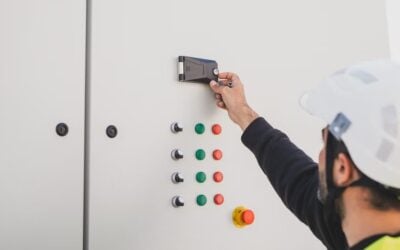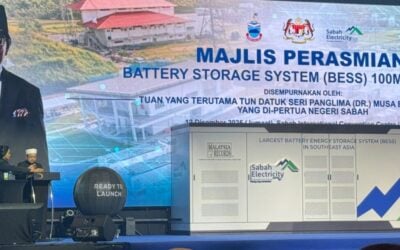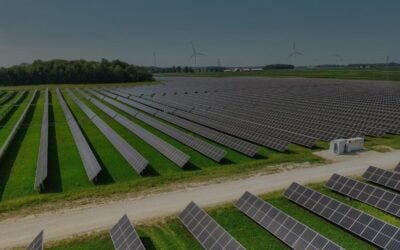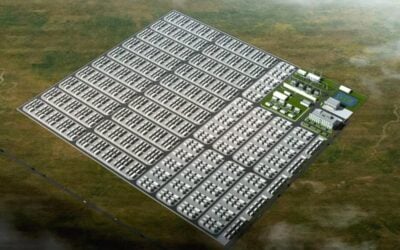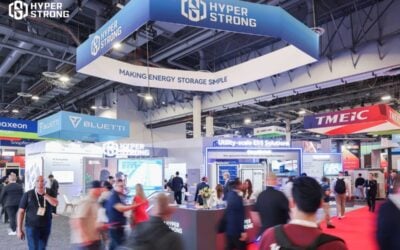The YCube. Younicos says it can accept a range of battery types and that individual cells can be replaced without compromising the system. Image: Younicos.
Battery-based energy storage integration and development company Younicos has launched a power converter unit and a standalone, easily deployable storage solution, with the company describing the move into hardware as a “next logical step”.
A spokesman for the company, which has “let the fossils rest in peace” as its corporate slogan, told PV Tech Storage that even with the recent ramping up of energy storage deployment, power conversion technology being used is not always immediately suited to the diverse range of new applications and world regions the industry requires.
“We developed our own power conversion system and the point here is that all this hardware that we’re using wasn’t originally planned for stationary energy storage, or not even energy storage.
“Most converters out there weren’t built for batteries. They were built for other things and have then been utilised for this solution but they weren’t originally designed for the solutions that they’re now being deployed for,” Younicos spokesman Philip Hiersemenzel said.
Try Premium for just $1
- Full premium access for the first month at only $1
- Converts to an annual rate after 30 days unless cancelled
- Cancel anytime during the trial period
Premium Benefits
- Expert industry analysis and interviews
- Digital access to PV Tech Power journal
- Exclusive event discounts
Or get the full Premium subscription right away
Or continue reading this article for free
Younicos has launched YCube, which is described as a “fully integrated standalone plug-and-play energy storage solution”, connecting a power conversion system (PCS) with lithium-ion battery blocks. According to the company, it can be used with a number of different battery types and the design stacks the PCS onto the DC battery block, reducing the space required to house the device, which comes in a boxed enclosure.
The YCube’s controls are embedded into the PCS, communicating directly with the batteries. Younicos claims it can meet any power/energy ratio requirements and provides an “ultra-fast” response time. The modular system comes in 250 or 500kVA building blocks, containing up to 450kWh of batteries. One YCube unit alone could handle applications up to 500kW, while several can also be aggregated, forming much bigger systems.
In addition to YCube, Younicos has launched the Y.Converter 250. The device is a power converter that was designed specifically for energy storage applications. Y.Converter has Younicos’ energy storage control platforms integrated in its PCS, as with YCube. This elimination of third-party devices can reduce total system response time to less than 35 milliseconds. In its ‘grid-forming’ mode it can also simultaneously run multiple PCS units, adjusting the current and sharing the load between several units.
‘Logical next step’ into hardware
Philip Hiersemenzel said the company chose to launch the hardware to leverage its accumulated practical knowledge of deploying around 100MW of storage around the world as well as the data Younicos has gathered. Younicos has been involved with projects including the UK’s ‘Big Battery’ trial and Germany’s first commercially operating battery park as well as what is now Europe’s largest battery storage system, unveiled earlier this month.
“Essentially it makes a more effective, cost effective and better solution. You make it faster, more precise and more suited to the requirements that it has. In a way it’s a logical next step. We’ve deployed all this stuff, we’ve learned so many things and so we’re just injecting intelligence into various pieces of hardware and make them more suitable for the applications that they’re being used for,” Hiersemenzel said.
Importantly, Hiersemenzel said, although the company has diversified into its own hardware, it remains open to different technologies and would certainly not see YCube as the most suitable solution in every instance.
“I have to stress that we remain open to all sorts of technology, including inverters. So we won’t only be deploying our converters, it depends on the application. [However] there are certain applications where this sort of off-the-shelf solution [can work]. What our engineering team have done with the design of this is that they’ve taken the lessons learned and the data we’ve gathered from almost 100MW of storage we’ve deployed worldwide, [to] find a better customised solution.”
Hiersemenzel said that while it can be grid-connected or work on its own, the plug and play storage system would be particularly suited to micro-grids and other remote applications, including islands as well as sites where lack of available space would be a concern.
Inside of the YConverter PCS. Image: Younicos.

